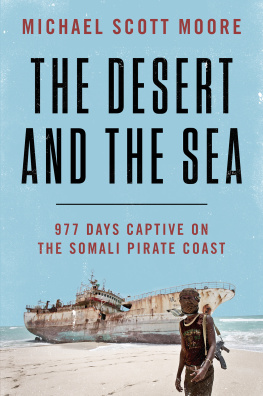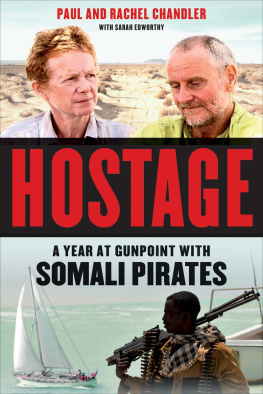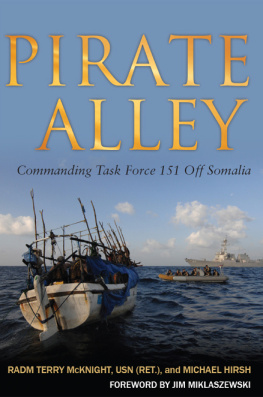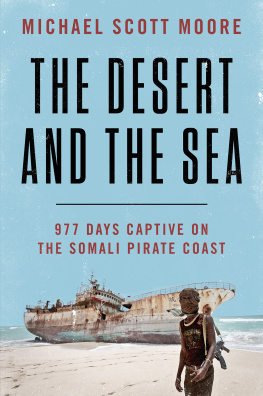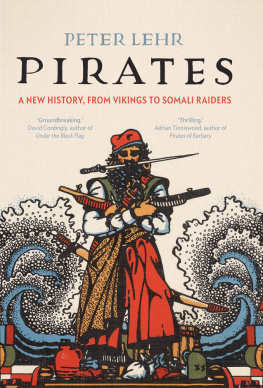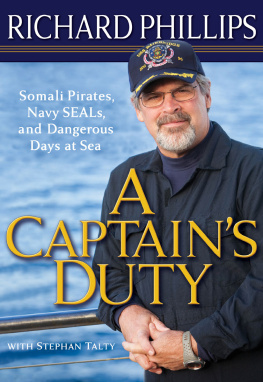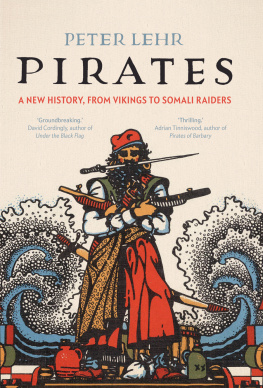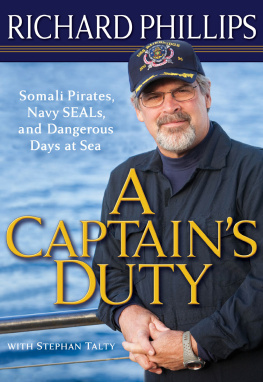Contents
For my mother
and the rest of my family, living and dead
In Algiers one speaks simply of the existence of two varieties of Islamone, which is called the Islam of the desert, and a second, which is defined as the Islam of the river (or of the sea). The first is the religion practiced by warlike nomadic tribes struggling to survive in one of the worlds most hostile environments, the Sahara. The second Islam is the faith of merchants, itinerant peddlers, people of the road and of the bazaar, for whom openness, compromise, and exchange are not only beneficial to trade, but necessary to life itself.
Ryszard Kapuscinski, Travels with Herodotus
Michael, I got a problem, said Rolly Tambara.
Whats the matter?
A pirate, he kick my Bible.
We sat in the shade of a conveyor belt on the work deck of a hijacked tuna ship. Rolly was my best friend on boardmy best friend in the Indian Ocean, where we were anchored, my best friend in Galmudug, the region of Somalia where wed met, my best friend in the Horn of Africa and maybe for a circumference of three or four thousand miles. He was a fisherman from the Seychelles, an old, wrinkled-eyed Catholic with a stout, short frame and a nearly bald head. He spoke a French-inflected Creole. Wed both been hauled aboard the Naham 3 after some time as hostages on shore.
Which pirate? I said.
I not know his name.
Rolly had been reading a tattered Bible in another corner of the deck when a Somali came downstairs from the bridge to make tea. While he waited for his water to boil, the pirate sat next to Rolly to inspect his reading material. The sight of a Bible offended him. Unwilling to touch it with his fingers, he leaned back to kick it with his salty bare foot.
Whered it go? I said. Did you get it back?
I run and get it, said Rolly.
What happened to the pirate?
He go back upstairs wit his tea.
You dont know his name?
Rolly shook his head.
You should tell Tuure, I said.
Ali Tuure was the pirate leader on this condemned vessel, a stoop-shouldered elderly Somali with ragged hair and a snaggletoothed smile. His weird sense of humor and sense of (relative) fairness gave him clout among the pirate guards. He walked around like a skeleton and greeted people with a skinny raised hand and a wheezy Heeyyyyyy, like a morbid imitation of the Fonz from Happy Days. He didnt like the sight of a Bible, either, but he never tried to impose Islam on his hostages, and he would have hated any display of (relative) disrespect.
Rolly walked across the deck to make his appeal to the Somalis upstairs. It caused a lot of confusion. I mixed a cup of instant coffee and wandered to the shoreward side of the ship. The town of Hobyo lay across the water, and to my nearsighted eyes it looked like a blurry jumble of rocks on the brownish desert shore. Zinc roofs reflected the sun in sharp pinpricks.
The Naham 3 was a fifty-meter long-liner, flagged in Oman but operated by a Taiwanese company. The hostages consisted of Chinese, Cambodian, Vietnamese, Indonesian, and Filipino fishermen. They sat behind uschatting, smoking cigarettes, playing cards. We lived like inmates of a floating internment camp. I was a skinny, lost-looking castaway, an American writer in his early forties who could remember a pleasant expatriate life in Berlin like a distant dream. After three or four months of captivity, I had shed about forty-five pounds. The Naham 3 had a hanging tuna scale, a spring-loaded contraption with a hook, and if you slung a loop of rope around the hook you could dangle from it like a dead fish.
A Chinese crewman, Jian Zui, stood by the rail with a cigarette. He had a plump, deadpan face that broke sometimes into a bright grin. He held out his cigarette pack to me.
No, no.
He tossed the end of his cigarette into the water and looked out at Hobyo. He placed two flat hands together and mimed a dive overboard. It shocked me, in that prison atmosphere, to see him demonstrate such a forbidden act: I glanced around at the Somali gunmen lazing on the upper deck. Jian Zui and I could hardly communicate, but we thought alikeId imagined the same escape dozens of times. I wondered if he could swim.
At last he smiled, as if the idea were a lark. He folded his hands to imitate Christian prayer. Santa Maria, he said, and rolled his eyes to heaven.
Among the Chinese on our ship, Santa Maria was slang for dead. He meant that if we jumped, we might die.
I nodded.
Soon a motorboat came bouncing across the swells. Supply skiffs buzzed out twice a day from Hobyo. Moto, said Jian Zui, and when it pulled alongside our ship, the arriving Somalis tossed up a thick line. Other men lashed it to the railing while both vessels lurched up and down on the water. Three or four Somalis sprang aboard. Another heaved up a heavy sack of khat, a leafy green stimulant plant that Somalis like to chew the way Westerners like to drink alcohol. The pirates argued about who should haul the sack upstairs.
For a few weeks in the summer of 2012 I watched these skiff deliveries with cautious optimism. I had mentioned my location in German during a phone call home to California. My mother had asked about a care packageCan we send you a care package, Michael?and the optimism in her voice made me dizzy with grief. A care package, to reach this vessel, would have to move through several layers of clan and criminal networks on the savanna. It was a sweetly intended idea, but what would be left of a care package when it came over the rail? A pair of shorts?
I felt a hot pressure behind my eyes.
A plane made a wide circle around Hobyo from the south, and I spotted it before I heard its engines. The gusting breezes on the water were constant, and they swept noises around in unpredictable ways. I couldnt see much without my glasses, but it was probably a European or American surveillance plane. While it made a wide turn over the land, a fierce old Somali with a damaged-looking face came out from the bridge deck and waved his pistol.
American! he hollered.
He thought it was a Western plane, too, and he didnt want me standing where it could spot me. A group of young pirates upstairs had moved to the far side of the deck. Low-ranking guards had learned to hide from aircraft to keep from exposing their faces to surveillance.
American! the old Somali hollered at me one more time, waving his pistol. This pirate had never shown me anything but hatred, and it burned me with outraged common sense to take an order from him. I lingered near the gunwale, watching the Somalis unload, until I was satisfied that no ludicrous, unlikely care package was on the skiff.
Ah, Michael, Rolly said from under the conveyor belt, against the gusting breeze. Not make them angry, Michael.
Part 1
The Rumor Kitchen
I
My father, who wasnt very original, used to say, Curiosity killed the cat, and of course I first went to the Horn of Africa out of curiosity. I liked the strange distances of the arid savanna, the rocky desert sound of the languages, the lack of Western pleasantries. Later I wanted to write about a pirate gang jailed in Hamburg. Their marathon trial was famous in Europe; it represented the first proceeding on German soil against any pirate in more than four centuries. Id reported on it for Spiegel Online, where I worked in Berlin, and it seemed to me that a book about the trial and some underreported aspects of Somali piracy might be interesting.
I also went as a student of Ashwin Ramans. He was an Indian documentary maker, a war correspondent for German TV, and I first met him in Djibouti in 2009, while I worked on a series of magazine columns about pirates. Djibouti is a small nation squeezed into East Africa at the mouth of the Red Sea, and its capital was a grid of crumbling French colonial buildings with occasional tent neighborhoodsslumsthat smelled like goat. The heat and glare were punishing. The traditional hotel for Europeans and wayward Americans was the expensive Hotel Mridien, just out of town. Drivers who picked me up for appointments in Djibouti were universally baffled that I hadnt reserved a room there. Its a nice hotel, said a young French expatriate who ferried me to a NATO ship on the first morning. He frowned with one corner of his mouth. You are the first journalist from Europe I have met who has not stayed there. But Id avoided the Mridien for the simple reason that it would tell me nothing about Djibouti. I dont even know where your hotel is, the driver confessed when we got stuck in traffic. I never come downtown.

